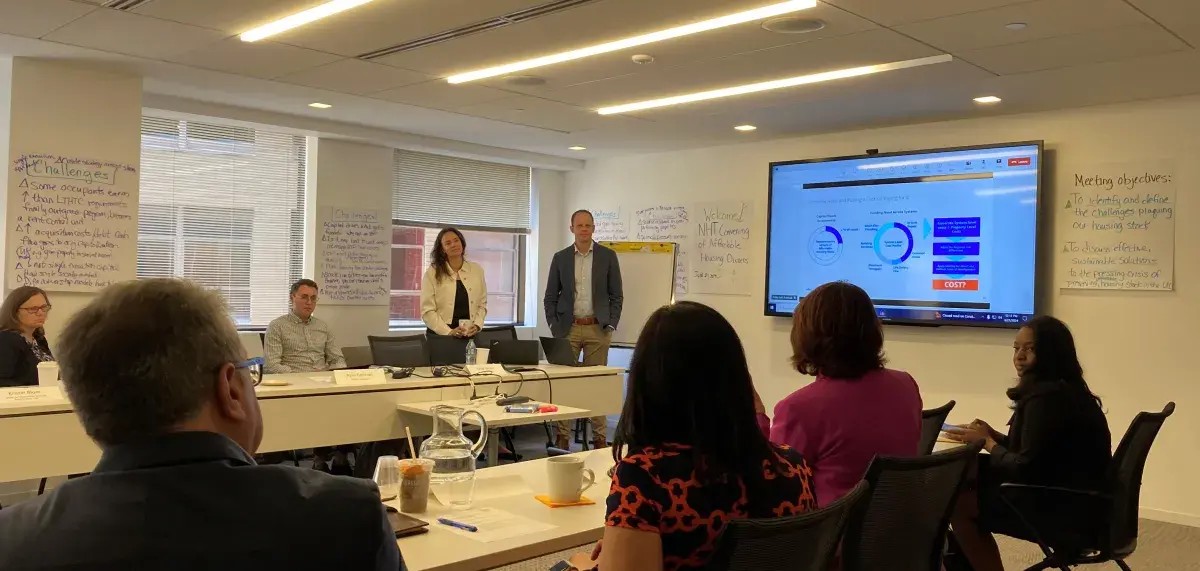Year End Season of Giving
Support affordable housing as we close out 2025.

In June, with support from the Melville Charitable Trust, NHT convened nearly 20 housing owners from across the country to discuss the challenges of affordable housing preservation (pictured above).
For nearly 40 years, National Housing Trust (NHT) has championed the preservation of affordable housing. In our early years, that took the form of advocating for federal programs like Mark-to-Market legislation and Project-Based Section 8. Our middle era is characterized by advocating for state housing finance agencies to allocate Low Income Housing Tax Credits (LIHTC) to preserve affordable housing and ‘green preservation’ to ensure that weatherization funding can support multifamily affordable housing. The most recent half-decade builds on both efforts, advocating for the long-term affordability of existing affordable housing and countering threats such as the Qualified Contract provision and challenges to the nonprofit Right of First Refusal. Throughout our existence, the National Preservation Working Group (which NHT convenes) has remained a vital and important coalition to champion the importance of preservation as a critical strategy in addressing our housing supply.
As the affordable housing crisis has evolved, so has NHT. We are entering a new chapter in our commitment to affordable housing preservation. As an owner of nearly 4000 affordable apartment homes throughout the Mid-Atlantic, we experience the same challenges that nearly all of our peers do, whether they are for-profit or nonprofit, subsidized or unsubsidized. As NHT’s CEO Priya Jayachandran highlighted in a recent Shelterforce article, there is growing recognition and urgency to confront the preservation crisis within our affordable housing crisis.
Even as we redouble efforts to address our national shortfall of 7 million affordable homes through new construction and zoning reform, we continue to lose ground in ensuring a viable, safe, and affordable array of housing options for low-income Americans. Certainly construction costs, zoning, access to land, regulations, and NIMBYs contribute to slow construction and production. Far less discussed however are deteriorating property conditions and insufficient resources for owners to address them which make our existing stock of affordable housing incredibly fragile. These conditions put residents at immediate risk and, over time, threaten our entire ecosystem of affordable housing as properties become unsustainable to operate, and eventually disappear from communities altogether.
In June (with support from the Melville Charitable Trust), NHT convened nearly 20 housing owners from across the country, representing a diversity of affordable housing typologies (for-profit, nonprofit, LIHTC, Section 8, public housing, unsubsidized) to assess the challenges that mission-driven owners, properties, and residents face. There was uniform consensus that the state of the existing stock, inadequacy of our policy and financial ecosystems, and mounting challenges put the entire affordable housing stock at risk and threaten the well-being of communities of color and low-income people for whom these communities are home. Among the key findings were:
These challenges are not simple ones to overcome. They will take months and years of concerted effort among a broad coalition of stakeholders – work that NHT is kicking off this year with a multi-year Campaign for Affordable Housing Preservation to stabilize current properties and create a more sustainable affordable housing operating model for the future. It begins with education. In recent months, NHT hosted a webinar on how to protect renters while increasing revenue for preservation, released a new NHT Update on how to balance eviction protection and property financial health, and published an in-depth analysis of how LIHTC funds are used to support preservation. We encourage you to explore these materials and let us know how the preservation challenge is unfolding in your community.
Write to preservation@nhtinc.org and let us know:
NHT is privileged to lead this work, and continue to carry the mantle of the importance of affordable housing preservation.